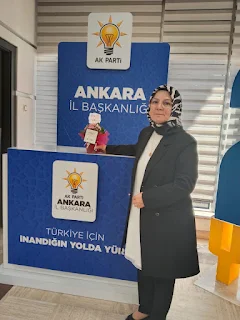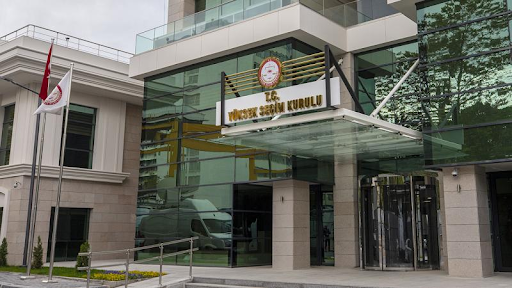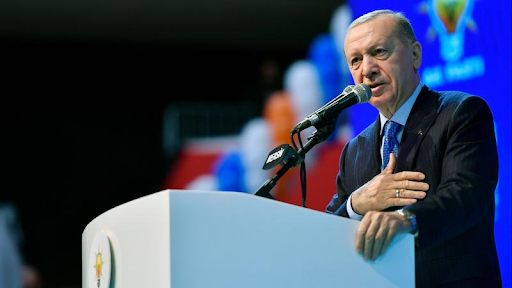The Big Congress of the AK Party will be held on Sunday
The AK Party, which came to power with the first general election it entered on November 3, 2002, 15 months after it was founded, and has ruled the country for 23 years, is the 8th AK Party. The Ordinary Grand Congress will be held on February 23 with the main slogan "AK in Name, Future in Light".
August November3, 2002 The AK Party, founded on August 14, 2001 under the leadership of Recep Tayyip Erdogan, took power alone by taking 34.28 percent of valid votes in the elections, 2002 Recep Tayyip Erdogan. Due to Erdogan's political ban, the first AK Party government formed under the prime ministership of Abdullah Gul is the 58th AK Party government in Turkey. He had a government.
Erdogan, who could not enter the November 3 elections due to a political ban, was elected as a deputy in the renewal elections held in Siirt on March 8, 2003. 58, headed by Rose. After the resignation of the government on March 11, 2003, Erdogan became the 59th President on March 14, 2003. He established the Republican Government of Turkey.
The AK Party, the ruling party, held its first local election exam on March 28, 2004. According to the results of the Provincial General Assembly election, he came first with 41.7 percent of the vote.
The first congress was held in October 2003
AK Party, 1. The 59th Ordinary Grand Congress. He did it on October 12, 2003, about 7 months after the formation of the government, and Erdogan, who received all the valid votes, was elected chairman. 2 In the ruling AK Party. The Ordinary Grand Congress was held on November 11, 2006. At this congress, Erdogan became the chairman again by receiving all the valid votes.
The 23rd of the Parliament. In the elections held on July 22, 2007 to determine the term deputies, the AK Party again came to power alone and became the third of the party headed by Erdogan, the 60th in Turkey. The government was established.
AK Party, 3. It held its Regular Grand Congress on October 3, 2009. Erdogan was once again elected chairman at this congress.
In the June 12, 2011 general elections, the AK Party won 49.83 percent of the vote and came to power alone for the fourth time, while Turkey's 61st. His government was established under the prime ministership of Erdogan.
The first extraordinary congress of the AK Party
AK Party, on September 30, 2012, 4. He held the usual Big Congress. Erdogan, who entered all four congresses as prime minister, was re-elected as chairman.
In August 10, 2014, Erdogan became the first President elected directly by the will of the people in the presidential election, and then the 1st President held on August 27, 2014. Ahmet Davutoğlu was elected chairman at the Extraordinary Grand Congress and then 62. He formed the government.
The AK Party failed to govern alone despite receiving 40.87 percent of the votes in the general elections on June 7, 2015. The 5th General Assembly held on September 12, 2015, in which Davutoglu was re-elected chairman. After the Ordinary Grand Congress, the AK Party won power alone in the early elections on November 1, 2015, and after the election, the 64th AK Party won power. The government was established.
AK Party's 2. An Extraordinary Great Congress
At the party, the 2nd held on May 22, 2016. There was another flag change with the Extraordinary Congress. Binali Yildirim, who is one of the founders of the party and has been a companion to Erdogan since his mayoral term, was elected AK Party Chairman and 65. He became the Prime Minister by forming the government.
The historic vote on April 16th
Turkey has entered a new era with the popular vote held on April 16, which was described as "historic". With the "yes" vote by 51.41 percent and "no" vote by 48.59 percent on April 16, 2017, the provision "The President-elect shall be dismissed from his party" in the Constitution was abolished and the way for party membership was opened for President Erdogan. In addition, the people decided to switch to the Presidential Government System.
Dec May 2, 2017, President Erdogan came to the AK Party Headquarters after a break of 979 days, signed the membership declaration and became a member of the AK Party.
Erdogan is president again
After President Erdoğan returned to the party, the decision was made to hold an extraordinary congress on May 21, 2017. AK Party's 3. Erdogan, who received all the valid 1414 votes at the Extraordinary Grand Congress, was re-elected Chairman of the party he founded.
6 In the AK Party. The regular Grand Congress was held on August 18, 2018. Erdogan, 6. He received all 1380 valid votes at the Regular Grand Congress.
COVID-19 pandemic, 7. Caused the usual Large Congress process to be prolonged
7 In the AK Party. The usual Big Congress process started in December 2019 with the slogan "Walk on the path you believe in". January March 2020, the plans of the AK Party, which aims to complete the provincial and district congresses and start the big congress process, were negatively affected by the COVID-19 pandemic, which began to have an impact all over the world and in Turkey in March 2020.
The congresses were postponed for a while taking into account the decisions of the Scientific Committee and the progress in the number of cases. After the decrease in the number of cases, the congresses were resumed in August by following the mask and distance rules.
President and AK Party Chairman Erdogan attended 12 provincial congresses face-to-face and other provincial congresses via live connection. After the completion of the provincial congresses in the AK Party, on March 24, 2021, the 7th. The usual Big Congress was held.
President Erdogan, taking all of the valid 1428 votes, re-entered the 7. he was elected Chairman of the AK Party for the first time.
4 Following the 2023 General Election. An Extraordinary Big Congress was held
The Presidential Election held on May 14, 2023 and the 28th. The AK Party, which emerged as the first party from the ballot box in the General Elections of the term, will be the 4th on October 7, 2023. He held an Extraordinary Great Congress.
At the congress, President Erdogan was re-elected chairman. At the Extraordinary Grand Congress, 49 of the current members of the Central Decision and Board of Directors (MKYK) did not take part in the new MKYK, while 26 names retained their place. 18 women and 57 men entered the MKYK lists.
The main slogan of the Great Congress is "AK in the Name, the Future in the Light"
Sunday February 23rd, the AK Party will hold 8. In the ordinary Large Congress process, district congresses started on October 12 and provincial congresses started on November 30.
Istanbul 8, which was held on February 7. The AK Party, which has completed the congress process in 81 provinces with the ordinary Provincial Congress, will hold the 8th AK Party Congress on February 23 at Ankara Sports Hall. Preparations for the regular Grand Congress are underway.
The main slogan of the congress, which was decided as "AK in name, Future in Light", is expected to be voted by 1607 delegates. It is also planned to introduce the new song of the AK Party and to screen a short film at the congress.
400 thousand delegates were asked questions with artificial intelligence support
Within the scope of the ongoing congress activities under the leadership of the Organization Presidency, "Common Mind Meetings" were organized in the provinces where district congresses were completed. With 400 thousand delegates in the districts, questions were directed to the delegates of the Big Congress about party politics. The answers given by the delegates were interpreted with the support of artificial intelligence.
It is aimed that the keywords that will be revealed with the responses received will contribute to the shaping of the AK Party's roadmap for the new period.

































